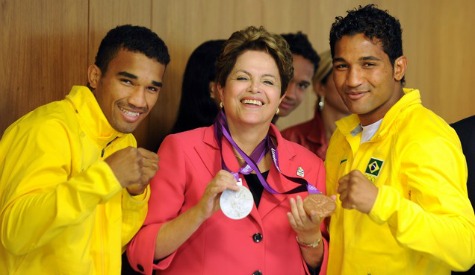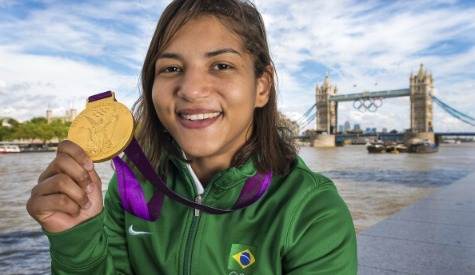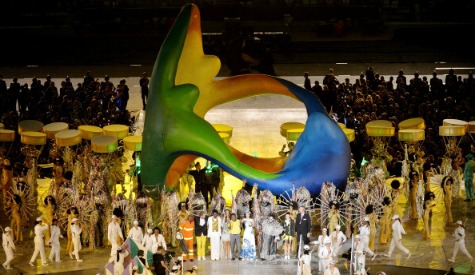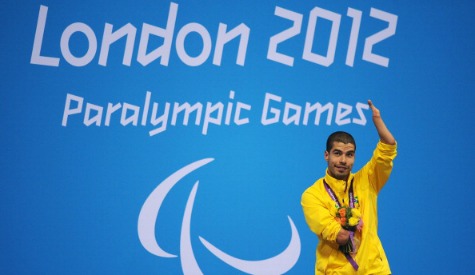 Brazil's athletes are to receive an additional $500 million (£308 million/€382 million) to help them prepare for Rio 2016, where they will be aiming for a place among the top ten in the medals table at the Olympics and top five at the Paralympics.
Brazil's athletes are to receive an additional $500 million (£308 million/€382 million) to help them prepare for Rio 2016, where they will be aiming for a place among the top ten in the medals table at the Olympics and top five at the Paralympics.
Brazilian President Dilma Rousseff (pictured) launched the new initiative at the Presedential Palace in Brasília and said the money from the programme, called "The Brasil Medalhas 2016" (Medals for Brazil 2016), will be spent on supporting athletes, purchasing modern training equipment and building more than 20 new Olympic training centres.
The country had already earmarked $750 million (£462 million/€573 million) to help athletes prepare for Rio 2016, the first time the Games have ever been held in South America.
About $150 million (£92 million/€115 million) was invested ahead of the London Games, when Brazil finished 22nd in the Olympics medal table.
Brazil won a record 17 medals overall, with three golds, two more than it did in Beijing and in Atlanta, to finish 22nd overall. In the Paralympics, meanwhile, the team came seventh with a total of 43 medals, including 21 gold, their best ever performance.
In the Paralympics, meanwhile, the team came seventh with a total of 43 medals, including 21 gold, their best ever performance.
"This plan will improve what we consider essential – the direct support to the athlete – through the Podium Grant and Coach Grant, among other initiatives," said Rousseff.
"It will also offer support in sports infrastructure and technology through training centres.
"It is fundamental that our country has high quality training centres.
"We will offer 22 training centres to support athletes and help them bring forward this ambition that every athlete has inside.
"It is also the ambition of 194 million Brazilians, expressed in you [athletes]." Two thirds of these funds will come from the Federal Government's general budget and one third will come from investments by state-owned companies.
Two thirds of these funds will come from the Federal Government's general budget and one third will come from investments by state-owned companies.
Eight companies have already signed up to the programme.
They are Banco do Brasil, Banco do Nordeste, BNDES (Brazilian Development Bank), Caixa Econômica Federal, Correios (Brazilian Post and Telegraph Corporation), Eletrobras, Infraero and Petrobras and Petrobras
These resources will be an addition to the Ministry of Sport's existing budget allocations for high performance sports and also in addition to funding from the Sports Incentive Law and Agnelo/Piva Law, which allocate two per cent of revenues from the national lottery to Olympic, Paralympic, school and university-related sports.
Brazil made its debut at the Olympics at Antwerp in 1920 when they finished 15th overall, which remains their highest ever position, although only 29 countries competed.
In more recent times their best performance was at Athens in 2004 when they were 16th overall with a total of ten medals, five of which were gold.
Based on the medals table at London 2012, Brazil will need to win a minimum of ten golds to achieve their top ten target in Rio.
Brazil made their Paralympic debut at Heidelberg in 1972, when they failed to win a medal.
But since Atlanta in 1996, when they finished 37th with 21 medals, including two gold, they have been climing steadily up the table, culminating in their performance in London, making a top five position at Rio 2016 a realistic ambiton. "The 2016 Olympics open our horizons and challenge us to improve our efforts to achieve more medals," said Sports Minister Aldo Rebelo.
"The 2016 Olympics open our horizons and challenge us to improve our efforts to achieve more medals," said Sports Minister Aldo Rebelo.
"The plan Brasil Medalhas represents a resource of one billion real (£308 million/$500 million/€382 million)over the next four years, already present and figured in the budget of 2013 to 2016, additional to the existing 1.5 billion (£462 million/$750 million/€573 million) real that was already intended for high performance sports."
The money will be invested in sports where Brazil believes it has the greatest opportunity of winning medals at Rio 2016.
Already 21 Olympic sports and 15 Paralympic sports have been identified as the focus of this programme.
The selected Olympic sports are: open water swimming, athletics, basketball, boxing, canoeing, BMX cycling, women's football, artistic gymnastics, equestrian, judo, wrestling, swimming, modern pentathlon, taekwondo, tennis, shooting, triathlon, sailing, volleyball and beach volleyball.
The Paralympic sports are: athletics, boccia, canoeing, cycling, wheelchair fencing, five-a-side and seven-a-side football, goalball, weight lifting, equestrian, judo, swimming, rowing, table tennis and sitting volleyball.
The Ministry of Sport, Brazilian Olympic and Paralympic Committees, national sports federations and States will jointly manage the programme, which is expected to be given official approval in December and finalised next January.
By Duncan Mackay
Source: www.insidethegames.biz
